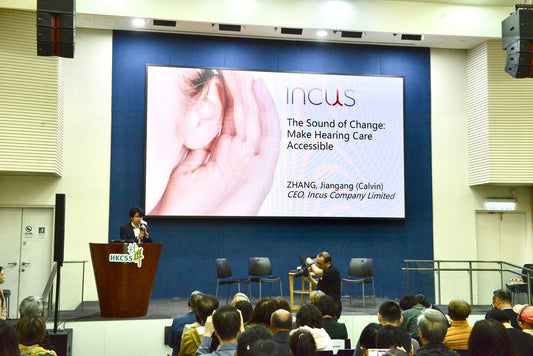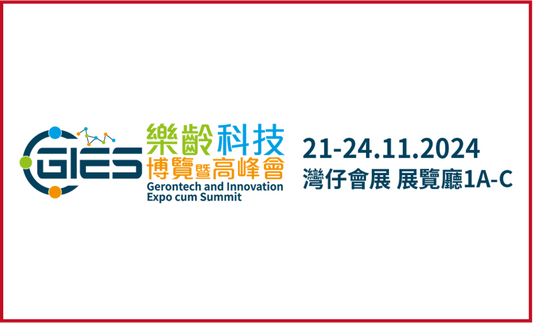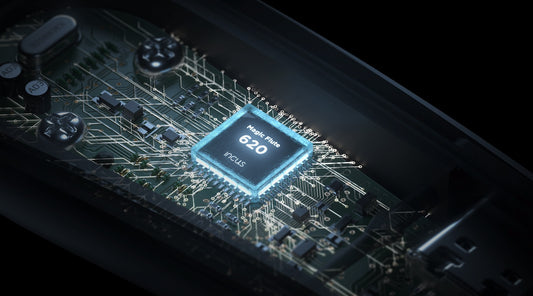Incus recently completed its Series A round, receiving tens of millions of Chinese Yuan in financing. This round was lead by Shunxi Fund (a venture capital fund managed by State-owned Capital Operation and Management Center of Beijing), and GRC co-invested. The proceeds will be used for product research and development and sales channel expansion.
The State of the Chinese Hearing Aid Market
According to EuroTrak, as of 2020, China’s hearing aid adoption rate is only 10%, and there is still a gap compared with Europe and the United States. To address this, Incus has launched a range of OTC hearing aids and smart personal sound amplifiers with brain-inspired hearing assistance algorithms and bone-vibration sensors. Incus recently launched receiver-in-the canal (RIC) hearing aids, which meet the needs of users with severe hearing loss and have received China NMPA medical device certification, in Mainland China.
Incus believes the way traditional hearing aids are sold and fitted are part of the reason for high prices and low adoption rates. “Taking the relatively mature North American market as an example, a significant portion of hearing aid prices comes from mark-up by sales channels to cover the cost of fitting services and overhead,” said Calvin Zhang, CEO and Founder of Incus. “Traditional hearing aids require a cumbersome process with multiple visits to a hearing aid technician for adjustments.”
How Incus Is Challenging the Status Quo
Incus uses technology to modernise the fitting process and offer hearing devices at only 10% the price of comparable imported hearing aids: Incus hearing devices can be set up and fitted from the comfort of the user’s home using an accompanying smartphone app. Sensors installed in the devices continuously monitor the environment, so that the devices can adapt in real-time to let the wearer hear clearly and comfortably. The software and hardware designs as well as packaging and after-sales support are designed to tackle issues OTC hearing aid users might encounter, to deliver an excellent out-of-the-box user experience.
Incus’ products also stand out in terms of physical design. The current flagship product, Kite 2, has a stylish neckband form and looks like a consumer earphone to reduce stigma. Its design is especially convenient for seniors with reduced finger dexterity or vision.
Incus’ products are sold online, for example through the official website, as well as Jingdong and Douyin (Chinese TikTok), where the products have been the best-selling in the category. Incus has also developed its own offline stores and collaborates with offline sales partners, such as with high-end eyewear chain stores, which have a large overlap in customer demographics. Offline, more than 3 out of 4 people will purchase immediately after trying. “In Japan, about 15% of hearing aids are sold in optical stores,” said Calvin Zhang.
What’s Next for Incus?
For the future, Incus plans to continue expanding its network of offline stores. It recently signed a cooperation agreement with a listed medical device company with plans to enter its stores, and collaborate in terms of research, training of personnel, and product certification. In addition, Incus plans to expand overseas to North America and Japan after establishing a foothold in the Chinese domestic market.
Investors’ Perspective
Shunxi Fund’s Investment Director, Zhao Yun, said: “With the aging population and a significant number of individuals experiencing hearing loss, the penetration rate of over-the-counter (OTC) hearing aids in China is far below the global average. The future market space for OTC hearing aids is enormous. Domestic startups are expected to leverage their advantages in rapid iteration of software and hardware development and a mature domestic supply chain to challenge the monopoly of overseas manufacturers. Based on the years of research and development achievements in the audio field by The Hong Kong University of Science and Technology, the company possesses independent core technology in software and hardware, leading product performance, and has established a sales channel that combines online and offline. With the hard work of the team, we believe that Incus will grow into a leading company in the domestic audio industry.”
Ben Zhou, Partner at GRC, said: “We are delighted to see Incus once again receiving recognition from the capital market. With its precise market insights and strong technological execution, Incus has broken through industry barriers and introduced disruptive and innovative hearing solutions that benefit numerous individuals with hearing impairments. Since its establishment, Incus has demonstrated outstanding team execution and proven its exceptional ability in rapid product iteration within the hearing aid market. We firmly believe that Incus’ innovative design concept, with software as the core, will completely disrupt the market ecosystem of traditional hearing aids. It will showcase significant differentiation advantages and fulfil the company's vision of achieving hearing accessibility for the global hearing-impaired community.”
About Incus
Founded in Hong Kong in 2016, Incus focuses on the research and development of over-the-counter (OTC) hearing aids and smart personal sound amplifiers. The founding team is from the Hong Kong University of Science and Technology (HKUST), and has many years of experience in hearing aid chips and algorithm development. Co-founder Professor Richard So is the Associate Dean of Engineering at HKUST, and has over three decades of research experience in the field of audio technology and over 40 papers published in top-tier journals. CEO Calvin Zhang holds a master’s degree from HKUST and has nearly 15 years of R&D experience in the audio field. He has authored several patents and journal papers. Co-founder Sigurd Anders Berg is from Norway and also graduated from HKUST.



